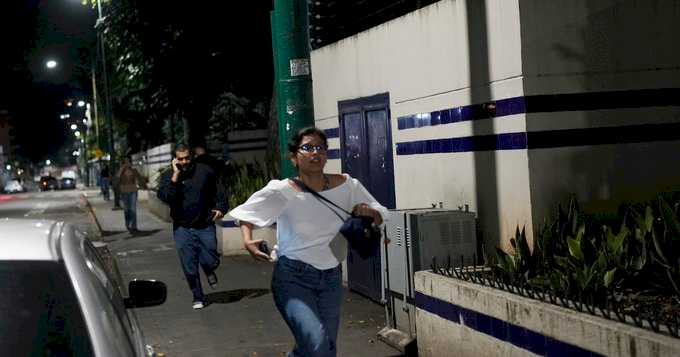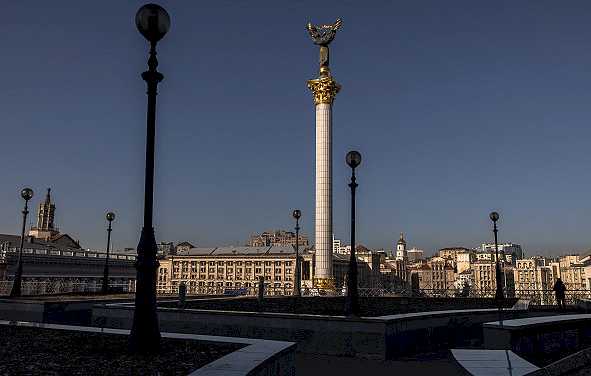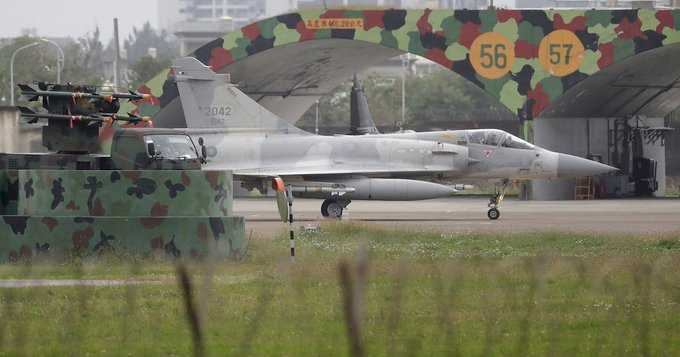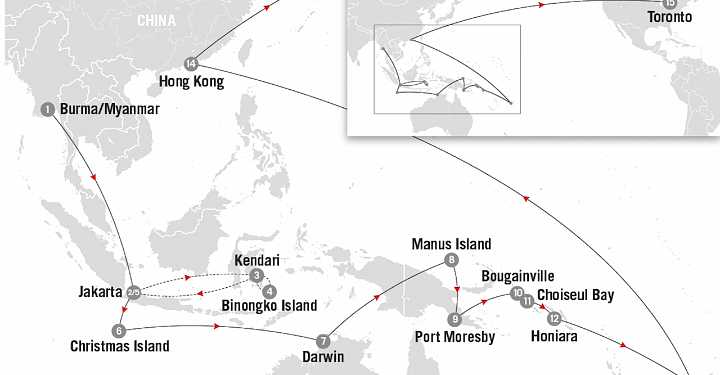US releases new photos of #Venezuelan President Nicolás Maduro in custody.
View 165 times
BREAKING : Kim Jong-un WARNS the United States amid the #Venezuela crisis, calling Nicolás Maduro his “friend” and demanding his IMMEDIATE RELEASE, saying:
“Release my friend or this oppression will lead to a WORLD WAR.”

View 159 times
Marco Rubio told the New York Times that he will wait to see if the current Venezuelan government hands over the oil.
If it refuses, new attacks on Venezuela will follow.

View 152 times
#CARACAS, Venezuela — The U.S. captured Venezuelan President Nicolás Maduro and flew him out of the country in a stunning military operation early Saturday that plucked a sitting leader from office — the culmination of months of escalating Trump administration pressure on the oil-rich South American nation.
Maduro and his wife, taken overnight from their home on a military base, were aboard a U.S. warship on their way to New York, where they were to face criminal charges.
U.S. President Donald Trump said the U.S. planned to run Venezuela until a transition of power can take place, and he claimed the American presence was already in place.
“We’re going to run the country until such time as we can do a safe, proper and judicious transition,” Trump said at a news conference where he boasted that “no nation in the world could achieve what America achieved.”
The legal authority for the attack, which echoed the 1990 U.S. invasion of Panama that led to the surrender and seizure of leader Manuel Antonio Noriega, was not immediately clear. The U.S. government does not recognize Maduro, who last appeared on state television Friday while meeting with a delegation of Chinese officials in Caracas.
Maduro and other Venezuelan officials were indicted in 2020 on “narco-terrorism” conspiracy charges, but the Justice Department released a new indictment Saturday of Maduro and his wife, Cilia Flores, accusing them of a role in narco-terrorism conspiracy.
U.S. Attorney General Pam Bondi vowed in a social media post that the couple would “soon face the full wrath of American justice on American soil in American courts.” Trump said the couple were aboard the U.S. warship Iwo Jima and headed to New York.
Trump, who was set to speak Saturday morning, posted on his Truth Social account a photo of Maduro blindfolded and in a sweatsuit aboard the ship.
Early morning attack
Early Saturday, multiple explosions rang out and low-flying aircraft swept through the Venezuelan capital. Maduro’s government accused the United States of attacking civilian and military installations, calling it an “imperialist attack” and urging citizens to take to the streets.
The attack lasted less than 30 minutes and the explosions — at least seven blasts — sent people rushing into the streets, while others took to social media to report what they’d seen and heard. Some Venezuelan civilians and members of the military were killed, said Vice President Delcy Rodríguez, without giving a number. Trump said some U.S. forces were injured in Venezuela but he believed none were killed.
Video obtained from Caracas and an unidentified coastal city showed tracers and smoke clouding the landscape as repeated muted explosions illuminated the night sky. Other footage showed cars passing on a highway as blasts illuminated the hills behind them. The videos were verified by The Associated Press.
Smoke was seen rising from the hangar of a military base in Caracas, while another military installation in the capital was without power.
Venezuelan ruling party leader Nahum Fernández told The Associated Press that Maduro and Flores were at their home within the Ft. Tiuna military installation when they were captured.
“That’s where they bombed,” he said. “And, there, they carried out what we could call a kidnapping of the president and the first lady of the country.”
Under Venezuelan law, Rodríguez would take over from Maduro. There was no confirmation that had happened, though she did issue a statement after the strike, demanding proof of life for Maduro and his wife.
The strike followed a months-long Trump administration pressure campaign on the Venezuelan leader, including a major buildup of American forces in the waters off South America and attacks on boats in the eastern Pacific and Caribbean accused of carrying drugs. Last week, the CIA was behind a drone strike at a docking area believed to have been used by Venezuelan drug cartels — the first known direct operation on Venezuelan soil since the U.S. began strikes in September.
As of Friday, the number of known boat strikes was 35 and the number of people killed at least 115, according to the Trump administration. Trump said that the U.S. is engaged in an “armed conflict” with drug cartels and has justified the boat strikes as a necessary to stem the flow of drugs into the U.S.
Maduro has decried the U.S. military operations as a thinly veiled effort to oust him from power.
Some streets in Caracas fill up
Venezuela’s ruling party has held power since 1999, when Maduro’s predecessor Hugo Chávez took office, promising to uplift poor people and later to implement a self-described socialist revolution.
Maduro took over when Chávez died in 2013. His 2018 reelection was widely considered a sham because the main opposition parties were banned from participating. During the 2024 election, ruling party-loyal electoral authorities declared him the winner hours after polls closed, but the opposition gathered overwhelming evidence that he lost by a more than 2-to-1 margin.
In a demonstration of how polarizing a figure Maduro is, people variously took to the streets to deplore his capture and celebrate it.
At a protest in the Venezuelan capital, Caracas Mayor Carmen Meléndez joined a crowd demanding Maduro’s return.
“Maduro, hold on, the people are rising up!” the crowd chanted. “We are here Nicolás Maduro. If you can hear us, we are here!”
Earlier, armed people and uniformed members of a civilian militia took to the streets of a Caracas neighborhood long considered a stronghold of the ruling party.
In other parts of the city, the streets remained empty hours after the attack, as residents absorbed events. Some areas remained without power, but vehicles moved freely.
“How do I feel? Scared, like everyone,” said Caracas resident Noris Prada, who sat on an empty avenue looking down at his phone. “Venezuelans woke up scared, many families couldn’t sleep.”
In the Chilean capital of Santiago, people waved Venezuelan flags and banging pots and pans as vehicles passed by honking at them.
In Doral, Florida, home to the largest Venezuelan community in the U.S, people wrapped themselves in Venezuelan flags, ate fried snacks and cheered as music played. At one point, the crowd chanted “Liberty! Liberty! Liberty!”
Questions of legality
The Armed Services committees in both houses of Congress, which have jurisdiction over military matters, have not been notified by the administration of any actions, according to a person familiar with the matter and granted anonymity to discuss it.
Lawmakers from both political parties in Congress have raised deep reservations and flat-out objections to the U.S. attacks on boats suspected of drug smuggling near the Venezuelan coast and Congress has not specifically approved an authorization for the use of military force for such operations in the region.

View 153 times
U.S. strikes Venezuela and says its leader, Maduro, has been captured and flown out of the country

View 152 times
#Japan says Trump has invited its leader to the US. It comes as ties with China are strained.
The White House is yet to confirm the call and the invitation. It comes as ties between Japan and China have been strained, ramping up tensions in the region. The U.S., a close ally of Japan, is seeking to strengthen its ties with Tokyo but also stabilize its relationship with Beijing ahead of a likely trip by Trump to China in April.
Beijing staged two-day military exercises in the waters off Taiwan this week. Takaichi, Japan’s first female prime minister, infuriated China late last year when she said Chinese military action against Taiwan could be grounds for a Japanese military response, breaking away from former Japanese leaders’ strategic ambiguity on the highly sensitive matter.
In a statement Friday, the Japanese foreign ministry said Takaichi and Trump agreed to coordinate for the visit to happen this spring. Kyodo News, Japan’s news agency, suggested that Takaichi’s trip could coincide with the annual cherry blossom festival in Washington.
The foreign ministry said the two leaders affirmed that they would “carve out a new chapter in the history of the Japan-U.S. alliance” in a year when the U.S. celebrates the 250th anniversary of its founding and that they would “further deepen the friendly relations” between the two nations, including economic and security cooperation.
Takaichi and Trump also agreed on their commitment to promoting cooperation among like-minded partners, including the Japan-U.S.-South Korea partnership, and to a free and open Indo-Pacific, the foreign ministry statement said.
The two exchanged views “mainly on the Indo-Pacific region,” the ministry said, but it did not provide details, including whether the two discussed recent actions by Beijing in the region.

View 158 times
#Ukrainian forces under ‘intense’ pressure in south, as troop shortage bites.
Ukrainian forces are under growing pressure in the south of the country, where less well-equipped units are vastly outnumbered by Russian brigades that have taken hundreds of square kilometers of territory in recent weeks.
The Russians have advanced across open countryside in several areas of the southern region of Zaporizhzhia. One Ukrainian officer with the country’s security service (SBU) told CNN on Wednesday that the situation in the region was “intense.”
“The enemy is trying to strengthen its negotiating position by attempting to capture more territory,” said the officer, who goes by the call sign “Bankir.”
The Russians were using small groups of infantry “who are trying to break through by any means, by any route, to the positions that are least protected,” he added.
Much of the recent fighting has been in and around the town of Huliaipole. Huliaipole lies some 80 kilometers (50 miles) east of the regional capital Zaporizhzhia, which had a pre-war population of more than 700,000.
At a meeting on Sunday attended by Russian President Vladimir Putin, the Russian commander in the region, Col. Gen. Andrei Ivanaev, claimed the town had been taken. Ivanaev told Putin that his forces had taken over 210 square kilometers of territory in the Dnipropetrovsk and Zaporizhzhia regions since early December, feeding the Kremlin’s narrative that ultimately Russia will achieve its goal of occupying four regions of eastern and southern Ukraine.
The unofficial Ukrainian conflict mapper Deepstate reported on Monday that Ukrainian troops continued to hold their positions in parts of Huliaipole but it was now a “grey zone,” with the Russians having “many times more personnel.”
Reinforcing positions in the town was difficult because it was low-lying, Deepstate said.
The Ukrainians rely extensively on drones in areas where they are short of infantry. In open countryside they are effective in taking out Russian platoons. But built-up areas of abandoned buildings and basements afford protection for advancing troops.
Last week, a video showed Russian troops had taken over a Ukrainian command post in Huliaipole and were examining laptops and files left behind.
The commander-in-chief of the Ukrainian military, Oleksandr Syrskyi, acknowledged the capture of the command post “due to weak defenses.”
A territorial brigade “could not withstand the enemy’s pressure during the fighting,” Syrskyi said, and gradually retreated, but criticized the battalion for leaving behind confidential information.
“Ukrainian forces may remain only in (Huliaipole’s) western part,” according to another independent monitor, the Conflict Intelligence Team (CIT). “Under these conditions, Huliaipole, much like Pokrovsk, may already be effectively captured,” it said.
“These troops held their positions for a long time and suffered extremely heavy losses over recent months yet were not rotated to the rear for rest and reconstitution,” CIT added.
What happened in Huliaipole goes to the heart of the Ukrainian military’s dilemma. Its troops are vastly outnumbered along some parts of the 1,000-kilometer front line and are struggling to mobilize additional forces to compensate for losses, according to several commentators.
“That means commanders must make hard choices about where to attack, where to defend and where to hope the Russians don’t exploit gaps in Ukrainian lines,” wrote analyst David Axe on Wednesday.
“A few territorial battalions cannot be expected to hold off a Russian motor rifle brigade, especially if the territorials lack strong support from adjacent artillery and drone units,” Axe noted.
The lack of a coherent command among Ukrainian forces in the south and the decision to prioritize defending other areas such as Pokrovsk and Kupiansk is also likely to have contributed to the worsening situation in the south.
In mid-December, the Ukrainian command diverted several elite units to Huliaipole, but “it was too little, too late” to save the town, Axe said.

View 170 times
The territory will ring in 2026 without spectacular and colorful explosions in the sky over its iconic Victoria Harbor after a massive fire in November that killed at least 161 people.
The city’s tourism board will instead host a music show Wednesday night featuring soft rock duo Air Supply and other singers in Central, a business district that also is home to the famous nightlife hub Lan Kwai Fong. The facades of eight landmarks will turn into giant countdown clocks presenting a three-minute light show at midnight.
Fireworks have long been part of the city’s celebrations for the New Year, Lunar New Year and National Day. The pyrotechnic displays against Hong Kong’s world-famous skyline of skyscrapers typically draw hundreds of thousands of people including many tourists to both sides of the promenade.
Hotels and restaurants likely affected
Rosanna Law, the territory’s secretary for culture, sports and tourism, acknowledged Tuesday that having no fireworks would affect some hotel and restaurant businesses.
Annie Wang, a tourist from Shanghai, said that although she had planned to watch the fireworks show, she understood the city’s decision because she found news of the blaze heart-wrenching.
“It’s quite regretful. But there’s no way around it after the fire,” said Wang, a university student.
Wang Miao, a teacher from the neighboring economic hub of Guangzhou, planned to join the official countdown activities in Central despite the absence of fireworks. She said it was a pity that she could not see pyrotechnics, but she could understand why.
“It doesn’t affect our experience in Hong Kong,” Wang said.
By early Wednesday evening, crowds of revelers had already gathered near the performance stage in Central, hoping to secure the best views of the musical performance.
Worst fire since the 1940s for Hong Kong
The financial hub’s worst blaze since 1948 broke out at Wang Fuk Court, in the northern suburban district of Tai Po, in late November. The apartment complex was undergoing a monthslong renovation project with buildings covered by bamboo scaffolding and green netting.
Authorities have pointed to the substandard netting and foam boards installed on windows as contributing factors in the fire’s rapid spread. Thousands of affected residents have moved to transitional homes, hotels and youth hostels, struggling to recover from the loss of lives and homes that took them years to buy. The casualties pained many residents across the city.
Past tragedies in Hong Kong have forced similar cancellations of fireworks. They include the 2013 National Day festivities following a vessel collision that killed 39 people on Oct. 1, 2012, and the 2018 Lunar New Year celebration after a bus crash that left 19 dead. During the 2019 anti-government protests and the COVID-19 pandemic, multiple displays also were scrapped.
The origin of fireworks is believed to date to China in the second century B.C., when someone discovered bamboo stalks exploded with loud bangs when thrown into fire, creating the first natural “firecrackers,” according to the American Pyrotechnics Association, a U.S. trade group.
The Guinness World Records organization says the first accurately documented firework, the Chinese firecracker, was created by Li Tian, a monk from China’s Tang dynasty dating to around 618 to 907 C.E. Li discovered that putting gunpowder in enclosed hollow bamboo stems created loud explosions and bound crackers together to create the traditional New Year firecrackers to drive out evil spirits, Guinness said.
Kanis Leung, The Associated Press

View 176 times
#MOSCOW, December 31. National security advisers from Ukraine and the countries of the "coalition of the willing" will meet in Kiev on January 3 and a leaders’ meeting is planned to be held in France on January 6, Vladimir Zelensky said.
"[Ukrainian National Security and Defense Council secretary] Rustem Umerov has just reported that an agreement has been reached with national security advisers form the countries of the coalition of the willing to hold a meeting in the near future. We plan that it will take place in Ukraine on January 3. Shortly after, we will talk at the level of leaders - we need meetings. We plan to meet in France on January 6," he wrote on his Telegram channel.
He thanked US President Donald Trump for his readiness to take part in all effective formats. "Our teams spoke today and we discussed with Rustem further steps and priorities at talks," he added.
Trump received Zelensky on December 28 at his Mar-a-Lago estate in Florida. After more than two hours of bilateral talks, Zelensky said that the US and Ukrainian negotiating teams would meet next week to finalized all issues that had been discussed. He also said that Trump’s meeting with the Ukrainian delegation and European leaders was planned for January.
Russian Foreign Minister Sergey Lavrov told TASS earlier that the major obstacle for peace in Ukraine is now the European Union. According to the top Russian diplomat, Brussels makes no secret of its plans to prepare for a war against Russia.

View 182 times
#China flexes blockade capabilities near Taiwan on second day of military drills.
Taiwanese officials said some of China’s live rounds landed closer to the island than before.
The maneuvers increased tension around the Taiwan Strait as 2025 drew to a close, but the impact extended beyond military pressure into everyday life. Taiwan’s Civil Aviation Administration was notified that seven temporary “dangerous zones” had been set up around the strait. The schedules of Taiwan’s four international airports on Tuesday afternoon showed over 150 international and domestic flights had revised times, delays or cancellations.
Xinhua, China’s official news agency, posted a commentary late Monday saying the drills sent an unequivocal message: That Beijing is always ready to prevent anything that tries to split Taiwan from China. Each escalation, it said, would be met with stronger countermeasures.
“By currying favor with the United States through obsequious loyalty gestures and promoting arms purchases, the DPP is binding the entire island of Taiwan to its catastrophic secessionist chariot, disregarding public opinion,” it wrote, referring to Taiwan’s ruling Democratic Progressive Party.
The PLA’s Eastern Theater Command sent destroyers, frigates, fighters and bombers to the waters to the north and south of the island to test its ability in sea-air coordination and blockading. Its ground forces carried out long-range, live-fire drills in the waters to the island’s north. They also organized live-fire training alongside simulated long-range joint strike with air, navy and missiles units, in the waters to Taiwan’s south, achieving what command spokesperson Li Xi called “desired effects.”
Hsieh Jih-sheng, deputy chief of the general staff for intelligence at the Taiwanese Defense Ministry, said some of the 27 rockets detected in the waters near Taiwan fell within its 24-nautical-mile (44-kilometer) line. “The landing points of rounds definitely were closer to Taiwan compared to the past,” he said. “This is a message it deliberately wants to convey.”
Aircraft, vessels and a Chinese balloon detected
Taiwan President Lai Ching-te said Tuesday his territory would act responsibly by neither escalating conflict nor provoking disputes. He condemned the drills.
Taiwan’s Defense Ministry said it had detected 130 aircraft, including fighters and bombers, 14 military ships and eight other official ships around the island between 6 a.m. Monday and 6 a.m. Tuesday. Its forces kept monitoring and deployed aircraft, navy ships and coastal missile systems in response. Ninety of the Chinese aircraft crossed the median line of the strait. A Chinese military balloon was also spotted, it said.
The ministry later said it detected 71 aircraft, 13 military ships and 15 coastal guard and official vessels as of 3 p.m. Tuesday, in addition to four other warships in the western Pacific. A total of 941 flights were affected by the drills, it said.
“The military power is not necessarily the strongest, but the scale of the drills has become larger each time compared to the last,” Hsieh said. He accused Chinese forces of trying to influence public morale and undermine trust in the Taiwanese military and government.
China has vowed to seize the island, by force if necessary. Beijing sends warplanes and navy vessels toward the island on a near-daily basis.
Chinese Defense Ministry spokesperson Zhang Xiaogang said the drills served as a stern warning to “Taiwan independence” separatist forces and external forces, without naming any countries.
He criticized Lai ‘s administration for what it called pandering to external forces and pursuing independence, saying that was the root cause of disrupting the status quo in the strait and escalating tensions.
Last week, Beijing imposed sanctions against 20 defense-related U.S. companies and 10 executives, following a Washington announcement of large-scale arms sales to Taiwan valued at more than $10 billion.
Under U.S. law, Washington is obligated to assist Taipei with its defense, a point that has become increasingly contentious with China over the years.
Beijing slams Japan
On Monday, U.S. President Donald Trump said that while he was not informed of the military exercise in advance, neither was he particularly worried about it. He touted his “great relationship” with Chinese President Xi Jinping and suggested he didn’t think Xi was going to attack Taiwan.
The Taiwan issue also heightened China-Japan tensions. Beijing has expressed anger at a statement by Japan’s prime minister, Sanae Takaichi, saying its military could get involved if China takes action against the democratically ruled island. There remains widespread overall suspicion in China about Japan that goes back generations to when imperial Japan brutally took over parts of China in the years before World War II.
Chinese Foreign Minister Wang Yi slammed both Japan and Taiwan’s “pro-independence forces.”
“Japan, which launched the war of aggression against China, not only fails to deeply reflect on the numerous crimes it committed, but its current leaders also openly challenge China’s territorial sovereignty, the historical conclusions of World War II, and the post-war international order,” he said Tuesday during an event in Beijing. China, Wang added, “must be highly vigilant against the resurgence of Japanese militarism.”
China and Taiwan have been governed separately since 1949, when the Communist Party rose to power in Beijing following a civil war. Defeated Nationalist Party forces fled to Taiwan, which later transitioned from martial law to multiparty democracy.
Stoking the tensions, China’s Eastern Theater Command posted a series of online images and videos carrying provocative language throughout the exercises. It posted a video of live rounds being fired from ships and a ground-based launcher on Tuesday.
Chen Wen-chin, chairman of the Keelung District Fishermen’s Association in Taiwan, said the group started radio broadcasting every hour from Monday to inform fishermen about where China’s exercises took place, urging them to avoid danger.
“The Chinese military exercises have prevented fishermen from fishing, which is their livelihood,” Chen said. “The inability to fish has had a significant impact on them and caused economic losses.”
Johnson Lai And Kanis Leung, The Associated Press
Leung reported from Hong Kong. Associated Press journalists Taijing Wu in Taiwan and Simina Mistreanu in Beijing contributed to this report.

View 176 times







Global News on Umojja.com